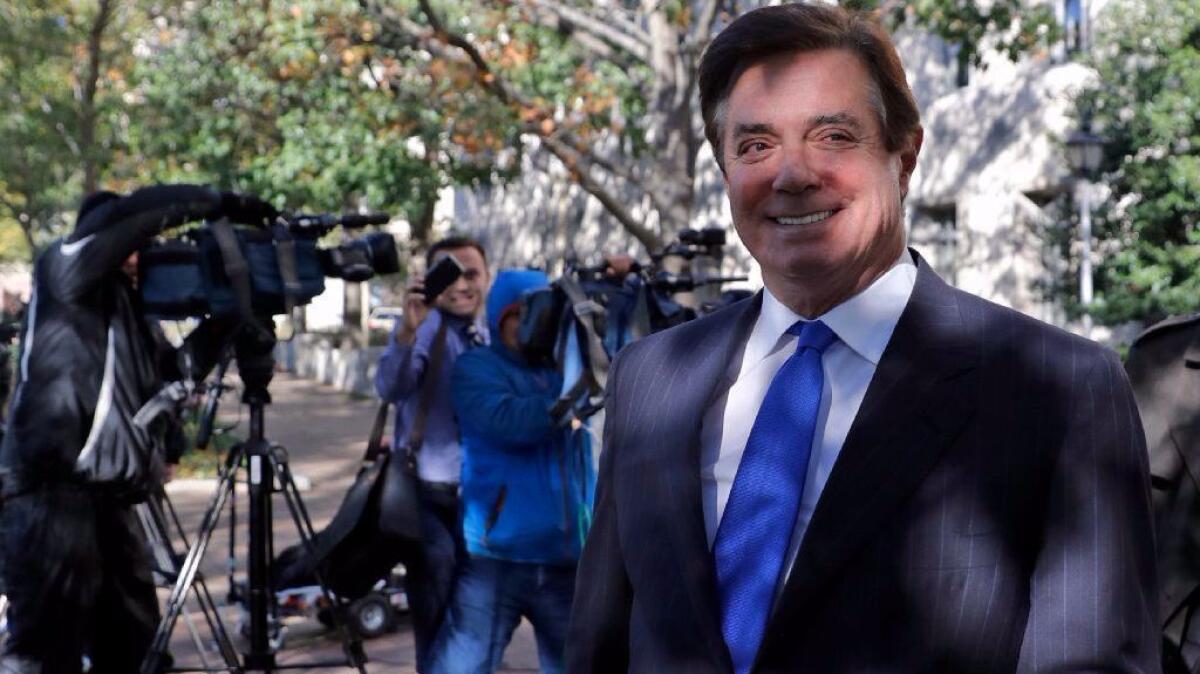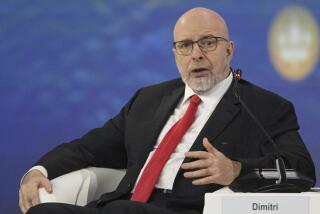Trump campaign chief led lavish lifestyle but hid tens of millions from taxman, prosecutors say

- Share via
Reporting from Washington — For decades before he was charged Monday with money laundering, tax evasion and fraud, President Trump’s former campaign manager straddled a lucrative divide, shaping presidential politics while banking tens of millions of dollars as a lobbyist for dodgy foreign clients.
Paul Manafort helped run no fewer than four successful presidential campaigns — those of Gerald Ford, Ronald Reagan, George H.W. Bush and Trump. His lobbying firm has represented U.S. corporate giants, including the tobacco industry, as well as dictators and other clients around the globe.
Manafort, now 68, served as a strategist and advocate for Philippine strongman Ferdinand Marcos, Zaire’s ruthless ruler Mobutu Sese Seko, and Angolan guerrilla leader Jonas Savimbi, who led one of Africa’s bloodiest civil wars. All three were backed by the U.S. government during the Cold War.
In the last decade, Manafort lobbied for and advised Ukrainian President Viktor Yanukovich, who was backed by the Kremlin.
Coincidentally or not, all four of those autocrats were forced from power.
Along the way Manafort got very rich — so much so that lawyers at his court arraignment Monday could not ascertain his total net worth. After Manafort pleaded not guilty, the judge granted prosecutors’ request to impose $10-million bail and ordered him under house arrest.
Manafort’s lawyer, Kevin M. Downing, derided the indictment as “ridiculous,” but didn’t specifically deny the charges outlined in the 31-page document.
The indictment does not mention one of Manafort’s properties, an apartment in Trump Tower in Manhattan. Nor do the charges refer to Manafort’s role, from March to August 2016, managing Trump’s presidential campaign.
He only stepped down last year when some of his unconventional financial dealings in Ukraine came to light, raising questions about whether he had laundered or properly reported tens of millions of dollars in foreign income — issues that form the basis for Monday’s charges.
In interviews, some consultants and lawyers who have dealt with Manafort said he grew indifferent to certain laws, or at least sloppy in his adherence to them, as he worked in Washington’s inner sanctums and with foreign miscreants around the globe.
“If you’re shooting fish in a barrel, one of them is going to be Paul Manafort,” said a Republican lawyer who has worked with him. He said Manafort had conducted himself as “an international man of mystery” whose fate now may resemble that of an iconic prey of American law enforcement.
“The obvious comparison here is between Manafort and Al Capone,” said the lawyer, who spoke on condition of anonymity. “He just didn’t pay his taxes.”
Manafort, described by acquaintances as circumspect about his methods, was always carefully coiffed and shod, so much so that the indictment alleges he spent about $1.4 million in laundered money just to pay men’s clothing stores in New York and California.
Millions more went for rugs, antiques, landscaping, housekeeping and cars — a Mercedes-Benz and Range Rovers, the indictments says. To boost his income, Manafort rented out a condominium in Manhattan’s trendy Soho district via Airbnb and then lied about it to get a lower mortgage interest rate, the indictment says.
He revealed something about his approach to winning in Washington when he testified at a House subcommittee hearing in March 1989 about his firm’s questionable dealings with federally funded, low-income housing.
Manafort said his lobbying and public relations firm — then named Black, Manafort, Stone & Kelly — had reaped a $326,000 consulting fee for securing a disputed $43-million rent subsidy grant for a client from the Department of Housing and Urban Development.
Manafort acknowledged that a representative of his firm, a former HUD official, had met personally on the matter with Deborah Gore Dean, then chief assistant to the Reagan administration’s secretary of Housing and Urban Development, Samuel R. Pierce Jr.
When a subcommittee member called that conduct “influence peddling,” Manafort was quick to deny the charge. “You might call it influence peddling. I call it lobbying,” he said.
“We worked the system as it existed,” he added. “I don’t think we did anything illegal.”
The federal indictment unsealed Monday in Washington alleges that Manafort did far more than work the system.
It says he failed to report or pay taxes on $75 million in income held overseas, while laundering about $18 million wired from offshore accounts to U.S. vendors and property sellers.
From 2008 through 2012, for example, Manafort tapped five accounts in Cyprus to pay $520,400 to a clothing store in Beverly Hills. The indictment identified the store only as “Vendor H.” Other money went to vendors in New York, Florida, Virginia and elsewhere.
Manafort and his top deputy, Richard W. Gates III, “laundered the money” through at least 25 U.S. and foreign corporations and shell companies or accounts they created in offshore banking havens, including Cyprus, St. Vincent and the Grenadines, and the Seychelles, the indictment states.
According to the indictment, Manafort and Gates “made a series of false and misleading statements” when confronted with evidence showing that they had not disclosed to the Justice Department their lobbying in Washington on behalf of the Ukraine government and its president and political parties.
On June 27, Manafort belatedly reported his work for Ukraine in filings he made under what is called the Foreign Agents Registration Act, or FARA. His failure to comply in a timely way with FARA led to some of the charges he now faces.
One lawyer who has advised Manafort said by telephone Monday that FARA did not clearly require prompt, full disclosure. Other lawyers noted that advocates of foreign clients run afoul of the law if they willfully make false statements, as the indictment of Manafort alleges.
Daniel R. Pickard, a lawyer at the Washington firm of Wiley Rein LLP, who represents other clients subject to FARA, said he was aware of “approximately seven prosecutions” under the law from 1966 through 2015.
“The purpose of the law is to increase transparency,” Pickard said, adding that he sensed “a perception in Washington that we are in a heightened period of enforcement.”
Lanny J. Davis, a White House lawyer during the Clinton administration who now specializes in clients facing high-profile embarrassment, said he had advised Manafort in conversations before the indictment to offer a public explanation for his actions.
“Tell it early, tell it all, tell it yourself,” said Davis, who has written a book about crisis management, “Truth to Tell.’’
Twitter: @davidcloudLAT
More to Read
Sign up for Essential California
The most important California stories and recommendations in your inbox every morning.
You may occasionally receive promotional content from the Los Angeles Times.















